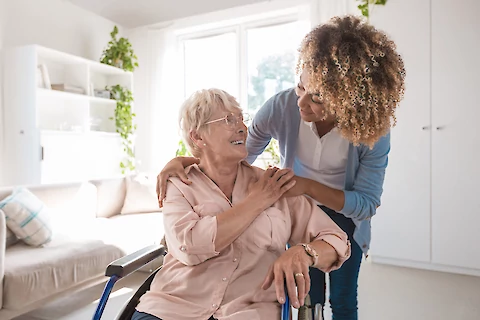
Sundowning is a common phenomenon experienced by many seniors with Alzheimer's, characterized by increased confusion, agitation, and anxiety during the late afternoon and evening hours. Managing these symptoms is essential for the well-being and comfort of both seniors and their families.
One excellent solution for coping with these symptoms is to enlist the help of a professional caregiver who can provide non-medical services tailored specifically for those experiencing sundowning. In this blog post, we will explore five ways a caregiver can help you or your loved one manage the effects of sundowning, making life a little easier and more enjoyable for everyone involved.
1. Provide Good Company
A caregiver can help seniors with Alzheimer's manage sundowning symptoms by providing companionship during the evening. Interaction is vital for maintaining cognitive health and emotional well-being, and a caregiver can step in to offer friendly interaction during those evening hours when family caregivers may be tired after a busy day. They can engage in various activities like reminiscing about old memories, playing cards, listening to music, or simply engaging in conversation, providing a comforting and supportive presence as the evening approaches for your senior loved one.
2. Maintain Evening Routines
Establishing and sticking to a structured routine can help minimize anxiety and confusion for seniors with Alzheimer's, promoting an overall sense of calm and stability. A caregiver can work with you and your loved one to develop a tailored evening routine. And it can incorporate activities like winding down with calming hobbies, preparing for bedtime, and providing gentle reminders about the steps involved in the routine. By maintaining a familiar and predictable schedule, a caregiver can help your loved one feel more secure and at ease as evening transitions to night.
3. Assist With Medications
Medication adherence is essential for ensuring the most effective management of Alzheimer's and its associated symptoms, including sundowning. A caregiver can provide essential medication reminders and assistance with organizing medications to ensure that seniors receive their prescribed dosage at the appropriate times.
4. Help With Evening Household and Self-Care Tasks
A caregiver can provide valuable support with other evening tasks that can contribute to a more comfortable and enjoyable living environment. A caregiver can assist with meal preparation, ensuring that seniors with Alzheimer's receive nutritious, well-balanced meals tailored to their dietary needs and preferences. They can also lend a hand with personal care tasks, such as bathing, dressing, and grooming, ensuring seniors feel clean, comfortable, and well cared for in the evening hours.
5. Provide Respite Care
Caring for a loved one with Alzheimer's can be both physically and emotionally demanding, and family caregivers need the opportunity to rest and recharge. By offering respite care, a professional caregiver can give family caregivers the peace of mind that their loved one is being well looked after while they take some much-needed time to care for themselves.
Rely On Senior Helpers
If you or a loved one are experiencing sundowning symptoms and live in the Raleigh, Cary, or Apex areas, consider the professional caregivers at Senior Helpers Triangle to help you manage these effects. Our experienced and compassionate team members are dedicated to providing the best care possible, tailored to the unique needs of seniors with Alzheimer's. Contact us today to learn more about how our services can help support your family.